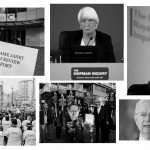As UK Prime Minister David Cameron has unveiled a range of new measures to boost the UK’s fight against white-collar crime at the Anti-Corruption Summit 2016, City law’s crime specialists have been discussing their impact.
Among several measures, Cameron has pledged to extend the offence of ‘failure to prevent’ to more economic crimes and will create an international anti-corporation centre to help police and prosecutors work together across borders.
At the international summit, which he is hosting at Lancaster House today (12 May), Cameron also announced he would make it compulsory for foreign companies owning land and property in Britain to join a public register of beneficial ownership, in a bid to reduce corruption.
The Ministry of Justice (MoJ) is to consult on the plan to extend the offence of ‘failure to prevent’ from beyond bribery and tax evasion to other economic crimes such as fraud and money laundering. In a statement the MoJ said under existing laws police and other agencies can struggle to prosecute corporations for such offences. The plan to extend the offence has been floated before, with support from Serious Fraud Office director David Green but in September last year the Ministry dropped them, saying that there was little evidence of corporate economic wrongdoing going unpunished.
Justice minister Dominc Raab said: ‘The government is finding new ways to tackle economic crime and we are taking a rigorous and robust approach to corporations that fail to prevent bribery or allow the tax evasion on their behalf.’
He added: ‘We now want to carefully consider whether the evidence justifies any further extension of this model to other areas of economic crime, so that large corporations are properly held to account.’
Clifford Chance partner Roger Best, who attended the summit, told Legal Business as more corporate offences are created, there will be more work for firms and the move will increase the likelihood of more deferred prosecution agreements.
He added: ‘In the legal business it will result in more white collar practices in the UK law firms.’
Pinsent Masons head of global corporate crime, Barry Vitou, said the new measures ‘represent the most sweeping changes to corporate law in over hundred years and a substantial burden for businesses.’
‘The extension to economic crimes such as fraud and money laundering would represent a massive shake-up – even bigger than the introduction of the Bribery Act five years ago.’
‘Reforms to liability will place multinationals and other companies under new pressures- executives will need to show that they had robust policies in place to prevent wrong-doing in the event that an employee is found guilty of misconduct.’
Meanwhile, Clyde & Co partner John Whittaker said the prospect of liability for corporates will encourage companies to put in place strong anti-money laundering procedures.
He commented: ‘In effect, the cost of those procedures will be borne by commerce and the outcome will be that many companies will need to spend significant funds in preventative measures even where perfectly legitimate funds are not linked to any criminal activity.’
With regard to the beneficial ownership register, fellow Clyde & Co partner Chris Burdett pointed out the full details need to come out before anyone can be sure the legislation will have any teeth.
He added: ‘On the face of it, the proposal to require all foreign companies buying properties in the UK to reveal ultimate beneficial ownership is to be welcomed and represents a genuine advancement in the fight to trace and recover the assets of fraudsters.’
Yesterday several City law firm leaders publicly pledged to tackle bribery, corruption, tax-evasion, money laundering and the financing of international terrorism ahead of today’s summit.
victoria.young@legalease.co.uk










